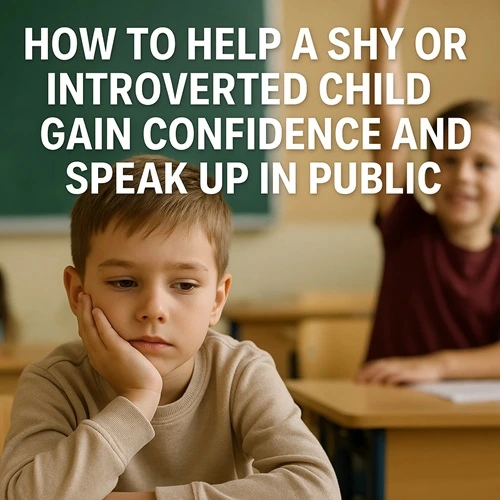I still remember the first time my son’s teacher told me, “He knows the answer, but he just doesn’t raise his hand.” My heart sank. At home, he was full of stories, laughter, and questions. But the moment he stepped into a classroom or a group, he went completely quiet. Slowly, I realized his shyness was making him invisible among peers and even an easy target for bullying.
If you’re a parent going through something similar, I want to tell you, you’re not alone. Many kids are naturally introverted or shy. That doesn’t make them weak or less capable. With patience, the right activities, and consistent encouragement, we can help our children find their voice. Here’s everything I learned while helping my own child overcome shyness.

Why Kids Stay Quiet in Public
When I began observing my son closely, I realized his silence wasn’t because he didn’t know what to say. It was because he was:
- Afraid of being laughed at if he made a mistake.
- Unsure if his opinions were good enough.
- Overwhelmed by louder, more confident children.
This helped me understand that shyness isn’t a problem, it’s simply a personality trait. My role as a parent wasn’t to change him, but to gently give him tools to express himself.
What Worked for Us as Parents
1. Building a Safe Space at Home
We started something small, dinner table talks. Each night, everyone shared one good thing about their day. At first, he gave one word answers. But slowly, he began describing things in detail. That safe space gave him confidence.
2. Small Wins Before Big Challenges
I didn’t push him into speaking in front of the class immediately. Instead, we began with simple situations:
- Ordering his own food at restaurants
- Saying “thank you” to the shopkeeper
- Introducing himself to relatives
Each small win built confidence for the bigger stage.
3. Activities That Made a Difference
Here’s what really helped:
- Drama Classes: Playing different characters removed the fear of being judged.
- Sports: Team games forced him to communicate naturally.
- Storytelling at Home: We made a game of drawing random words from a jar and creating stories.
- Reading Aloud: Every night he read a page from his favorite book, helping his voice grow stronger.
4. Teaching Assertiveness to Handle Bullies
One painful memory I carry is when he came home upset because a classmate teased him for being “quiet.” We practiced simple but strong responses at home, like:
- “I don’t like that. Please stop.”
- Walking away calmly.
These role play sessions gave him the courage to face bullies without breaking down.
5. Celebrating Every Little Victory
The day he raised his hand in class for the very first time, we celebrated like he had won a trophy. That encouragement showed him that speaking up—even once, was a big achievement.
6. Avoiding Comparisons
One of the biggest mistakes I almost made was comparing him to his outgoing cousin. Thankfully, I stopped myself. Instead, I began highlighting his strengths in creativity, kindness, problem solving skills. This made him feel valued for who he was.
7. Leading by Example
I realized kids watch us more than they listen. I started participating more confidently in parent meetings, community events, and even family discussions. Seeing me speak up encouraged him to do the same.
Fun Activities Parents Can Try at Home
- Mirror Practice: Ask your child to talk about their day for 2 minutes in front of a mirror.
- Family Talent Show: Give everyone 2 minutes to perform, sing, dance or tell a joke.
- Story Jar Game: Pick 3 random words and create a fun story.
- Gratitude Circle: Share one thing everyone is thankful for daily.
These little activities slowly reduce hesitation and build confidence in a stress free way.
When Professional Help May Be Needed
If shyness turns into extreme anxiety like refusal to go to school, frequent stomach aches before class presentations, or isolation from friends, don’t hesitate to seek help from a counselor or child psychologist. Sometimes professional guidance can speed up progress.
Final Thoughts
Today, my son is still on his journey. He isn’t the loudest voice in the room, but he isn’t afraid to speak anymore. And that’s a huge win.
As parents, our role is not to change who they are, but to hold their hand as they learn to shine in their own way. Remember: every confident speaker was once a hesitant child who just needed a little encouragement.
FAQs on Helping Shy or Introverted Kids
1. Is shyness a personality problem?
No. Shyness is a natural trait, not a flaw. It only becomes a concern if it limits your child’s learning or makes them vulnerable.
2. What activities can help shy kids become confident?
Drama, debate clubs, sports, storytelling, music, and public speaking workshops are excellent for boosting confidence.
3. How do I stop my child from being bullied for being quiet?
Teach them simple assertive responses, inform teachers, and build resilience by focusing on their strengths.
4. How can I encourage my child to speak in class?
Start with small steps like sharing at home, then encourage participation in small groups, before moving to larger audiences.
5. Should I compare my shy child to more confident kids?
No. Comparisons damage self-esteem. Instead, celebrate your child’s unique strengths.
6. Can introverted kids become good public speakers?
Absolutely. Many famous speakers were once introverts. With practice and encouragement, introverted kids can excel at expressing themselves.
7. How can I make my child feel safe about sharing thoughts?
Create a judgment-free space at home, listen actively, and praise efforts instead of only results.
8. What should I do if my child avoids school presentations completely?
Support them with practice at home, encourage small steps, and if anxiety is severe, consult a child psychologist.
9. At what age should I start confidence-building activities?
The earlier, the better. Even at preschool age, games like storytelling and role-play help.
10. Can shy children grow out of it naturally?
Some do, but many need gentle guidance. With the right support, children usually become more comfortable over time.
For more such Parenting Tips , Follow Popnewsblend.com.

Hi, I’m Prashant Jain — a curious soul, storyteller, and content creator at heart.I’ve always been drawn to the world of entertainment, travel, sports, health & lifestyle — not just as a writer, but as someone who genuinely lives these experiences. Whether I’m binge-watching the latest OTT series, exploring offbeat spiritual destinations in India, or diving deep into wellness routines and cricket match insights, I love sharing what I discover with like-minded readers.
PopNewsBlend is my way of blending personal journeys with meaningful stories — ones that inform, inspire, and keep you ahead of the curve. Everything I write comes from real observations, hands-on experiences, and a deep passion for understanding the world around us.
Discover more from Popnewsblend
Subscribe to get the latest posts sent to your email.







